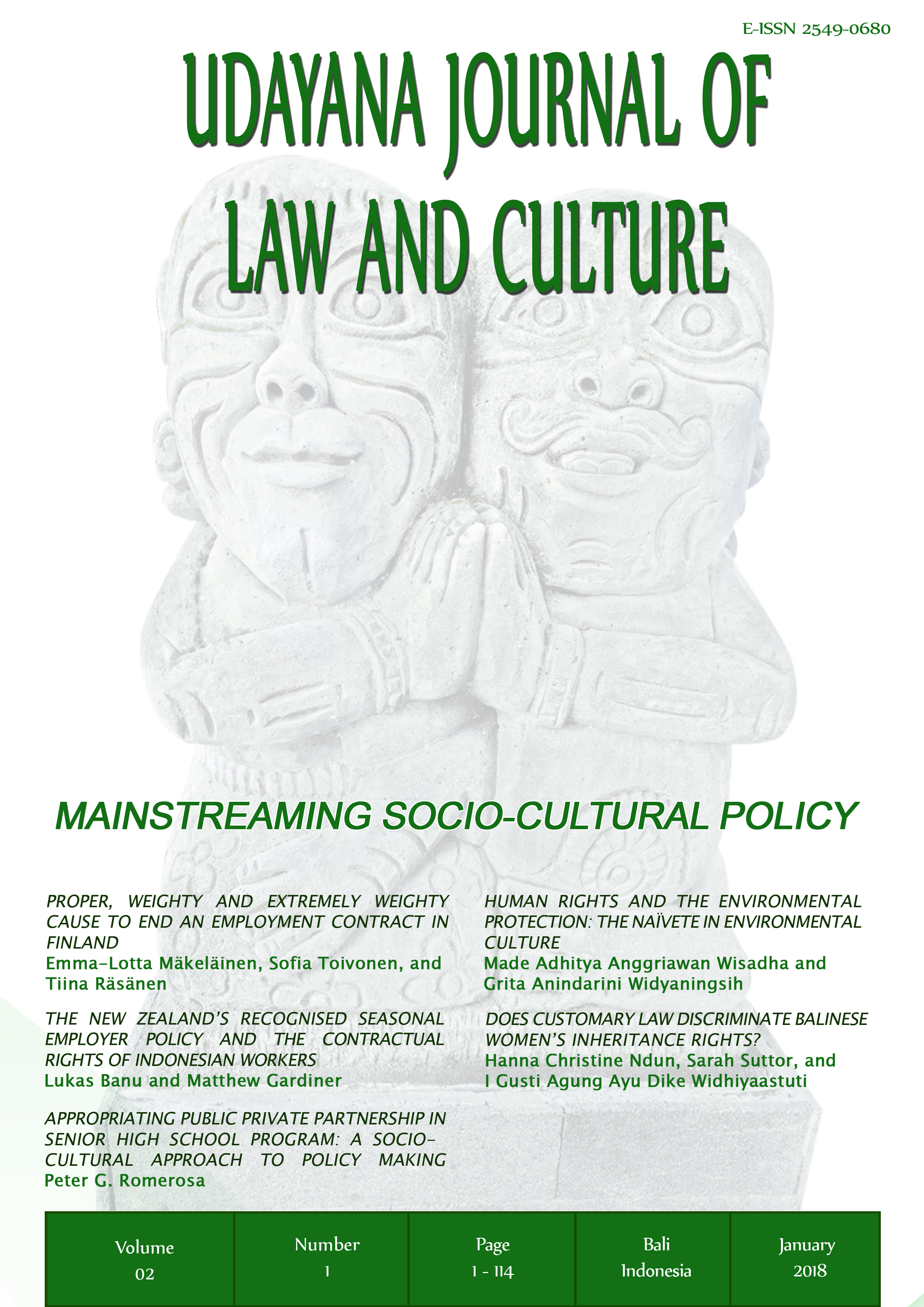Does Customary Law Discriminate Balinese Women’s Inheritance Rights?
Abstract
There is a stereotype with regard to the rights of the Balinese women on inheriting under the Balinese tradi-tional customary law. It is generally assumed that the law discriminates Balinese women as well as against the human rights principle of equality. This article analyzes the contemporary problems of such issue and would demonstrate the actual principles, rules and practices, including the essential concept of the rights under the Balinese traditional customary law of inheritance. This issue has been explored under a normative legal approach where the resources are primarily taken from the relevant national legal instruments and court decisions, instead of textbooks and journals. An interview has also been commenced for clarifying some aspects of the issue. This article concludes that there has been a generally misleading on viewing the Balinese customary law as discriminating women on an inheritance issue, as in fact, the law also provides rules for supporting women’s rights for inheriting. The law in a certain way has properly preserved the right of women for inheriting in which women under the law have also enjoyed rights for inheriting, especially the daughter and widow. In contrast, the Balinese men that are generally perceived as the ultimate gender enjoying privileges rights to inherit, in the practice of inheritance in the traditional community are also subject to some discrimination. The law has provided a set of rule of inheritance both for men and women where they are subject to certain equal rule and condition. The law also clarifies that both genders are enjoying equal rights on inheritance in a certain portion and situation binding under the principle of balancing between rights and obligation for each side.
Downloads
References
Wiranata, I Gede A.B. Hukum Adat Indonesia Perkembangannya dari Masa ke Masa, Bandung: PT. Citra Aditya Bakti, 2005.
Soekanto, Soerjono. Hukum Adat Indonesia, Jakarta: PT. Raja Grafindo Persada, 2011.
Windia, Wayan P. Hukum Adat Bali Dalam Tanya Jawab. Bali: Udayana University Press, 2013.
JOURNAL ARTICLE
Ardika, I Nengah. ”Pemberian Hak Waris bagi Anak Perempuan di Bali dalam Perspektif Keadilan.” Jurnal Magister Hukum Udayana 5, no. 4 (2016): 639 – 649. doi: https://doi.org/10.24843/JMHU.2016.v05.i04.p01.
Arta, I Komang Kawi, Ketut Sudiatmaka, Ratna Artha Windari. “Realisasi Keputusan Pesamuhan Agung III MUDP Bali terhadap Pewarisan Anak Perempuan Bali Aga di Kabupaten Buleleng.” E-Journal Komunitas Yustitia Universitas Pendidikan Ganesha Jurusan Ilmu Hukum 1, no. 1 (2018).
Barlinti, Yeni Salma, “Inheritance Legal System In Indonesia: A Legal Justice For People”, Indonesia Law Review 1, no.1 (2013): 23-41, http://dx.doi.org/10.15742/ilrev. v3n1.28
Creese, Helen, abstract “The Legal Status of Widows And Divorcees (Janda) in Colonial Bali”, Indonesia and the Malay World 44, no. 128 (2016): 84-103. https://doi.org /10.1080/13639811.2015.1100862
Dangin, Ni Luh Gede Isa Praresti, Koesno Adi , Iwan Permadi, Kedudukan Hak Mewaris Wanita Hindu dalam Sistem Hukum Adat Waris di Bali, Jurnal Hukum, Magister Ilmu Hukum dan Kenotariatan Universitas Brawijaya (2015)
Dyatmikawati, Putu. “Inheritance Rights of Women Based on Customary Law In Bali”, International Journal of Business, Economics and Law 11, no. 4 (2016): 13-16. http://ijbel.com/wp-content/uploads/2017/01/LAW-5.pdf
Gultom, Elfrida R. “Development of Women Position in the Patrilineal Inheritance of Indonesian Society.” Jurnal Dinamika Hukum 17, no. 2 (2017): 195-202, http:// dx.doi.org/10.20884/1.jdh.2017.17.2.886
Hendrako, Edo. “Hak Waris Anak Perempuan Terhadap Harta Peninggalan (Studi Ka-sus Putusan MA RI No. 4766/Pdt/1998).” Lex Privatum 3, no. 1 (2015): 84-98.
Polavarapu, Aparna. “Procuring Meaningful Land Rights for the Women of Rwanda.” Yale Human Rights and Development Journal 14, no.1 (2014):105-154.
Ramteke, Prerna S., “Knitting the Future Story of Indian Women: Preventing Violence, Fostering Development, and Accelerating Empowerment”, Udayana Journal of Law and Culture 1, no.2 (2017): 98-120. doi:10.24843/UJLC.2017.v01.i02.p02.
Ratmini, Ni Ketut Sri. “Hak Warisan dan Hubungannya Dengan Daha Tua Menurut Hukum Adat Bali.” Jurnal Magister Hukum Udayana 4, no. 2 (2015): 391 – 406. https://doi.org/10.24843/JMHU.2015.v04.i02.p19
Setyawati, Ni Kadek. “Kedudukan Perempuan Hindu Menurut Hukum Waris Adat Bali dalam Perspektif Kesetaraan Gender.”, Jurnal Penelitian Agama Hindu 1, no. 2 (2017): 618-625.
Westendorp, Ingrid. “Personal Status Law and Women’s Right to Equality in Law and in Practice: The Case of Land Rights of Balinese Hindu Women.” Journal of Human Rights Practice 7, no.3 (2015): 430-450. https://doi.org/10.1093/jhu-man/huv013
LEGAL DOCUMENTS
The 1945 Constitution of the Republic of Indonesia
Indonesian Civil Code
Act of the Republic Indonesia No. 5 Year 1960 concerning Basic Regulations on Agraria
Act of the Republic Indonesia No. 1 Year 1971 concerning Marriage
Act of the Republic of Indonesia No. 39 Year 1999 concerning Human Rights
Provincial Regulation of Bali No. 3 Year 2001 concerning Desa Pakraman
CASE LAW
Decision, Indonesian Supreme Court, No.179K/Sip/1961, dated 23 October 1961.
Decision, Indonesian Supreme Court, No. 100K/Sip/1967 dated14 June 1968.
Decision, Indonesian Supreme Court, No. 4766/Pdt/1998 dated 16 November 1999.
Decision, Indonesian Supreme Court, No. 1048 K/Pdt/2012, dated 26 september 2012.
WEBSITE CONTENT
“Hukum Waris Islam dan Pembagiannya,” August 3, 2016, https://dalamislam. com/hukum-islam/hukum-waris-islam
“Tahun 2017 Majelis Utama Desa Pakraman Bali Kukuhkan 5 DP Baru, Salah Satunya di Tabanan,” December 8, 2017, https://www.beritabali.com/ read/2017/12/08/201712080017/Tahun-2017-Majelis-Utama-Desa-Pakraman-Bali-Kukuhkan-5-DP-Baru-Salah-Satunya-di-Tabanan.html
INTERVIEW
I Wayan Windia, Interview by Authors. Bali Santhi Secretariat, Denpasar, December 4, 2015








